CESA

Acerca da Repartição Funcional do Rendimento na Economia Portuguesa
Abstract:
The functional division of income – that is, the question of its primary distribution across the different factors of production and, in particular, between labour income (wages) and capital income (profits, interest and rents) – has been a major theme in political economy since its early days. Acerca da repartição funcional do rendimento na economia Portuguesa empirically analyses the evolution of the wage share in income in Portugal between 1960 and 2017, proposing a grid for interpreting the evolution of the functional distribution in the Portuguese economy characterised by the existence of different periods. Depending on the period in question, the empirical results reveal the existence of strong and significant associations between the evolution of the functional distribution and the real GDP growth rate, the inflation rate and the unemployment rate, respectively. These results suggest the succession over time of different regimes regulating the functional distribution of income in the Portuguese economy, which shift from countercyclical to procyclical over the period under review. The article is organised as follows: after this introduction, section 2 briefly discusses the interest of functional income distribution analysis and its linkages with some other debates in economic theory and analysis; section 3 outlines the evolution of the functional distribution of income in the Portuguese economy in the decades since 1960 and its main trends over time; section 4 carries out a set of bivariate, multivariate and structural stability analyses in order to contribute to a better understanding of the determinants of such evolution; and section 5 concludes.
Quotation:
Abreu, Alexandre; July 2020; 3) “Acerca da repartição funcional do rendimento na economia portuguesa”; Notas Económicas, no. 50; 8) pp. 85-101.
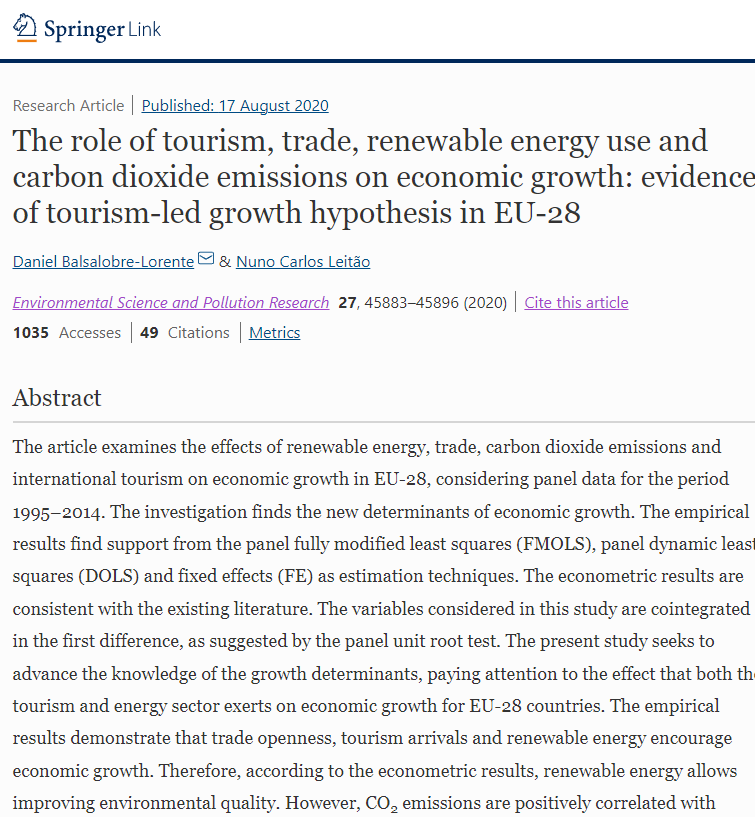
The role of tourism, trade, renewable energy use and carbon dioxide emissions on economic growth: evidence of tourism-led growth hypothesis in EU-28
Abstract:
The Role of Tourism, Trade, Renewable Energy Use and Carbon Dioxide Emissions on Economic Growth: Evidence of Tourism-Led Growth Hypothesis in EU-28 examines the effects of renewable energy, trade, carbon dioxide emissions and international tourism on economic growth in EU-28, considering panel data for the period 1995–2014. The investigation finds the new determinants of economic growth. The empirical results find support from the panel fully modified least squares (FMOLS), panel dynamic least squares (DOLS) and fixed effects (FE) as estimation techniques. The econometric results are consistent with the existing literature. The variables considered in this study are cointegrated in the first difference, as suggested by the panel unit root test. The present study seeks to advance the knowledge of the growth determinants, paying attention to the effect that both the tourism and energy sector exerts on economic growth for EU-28 countries. The empirical results demonstrate that trade openness, tourism arrivals and renewable energy encourage economic growth. Therefore, according to the econometric results, renewable energy allows improving environmental quality. However, CO2 emissions are positively correlated with economic growth, showing that growth is directly correlated by climate change and greenhouse gas. The results also confirm the tourism-led growth hypothesis (TLGH) for the panel. Finally, the empirical results confirm that trade openness, energy use and international tourism contribute to enhance economic growth. Based on these findings, further insights and policy prescription are offered in the concluding section.
Quotation:
“Balsalobre-Lorente, D., Leitão, N.C. (2020): The Role of Tourism, Trade, Renewable Energy Use and Carbon Dioxide Emissions on Economic Growth: Evidence of Tourism-Led Growth Hypothesis in EU-28. Environmental Science and Pollution Research. Publisher: Springer International Publishing”
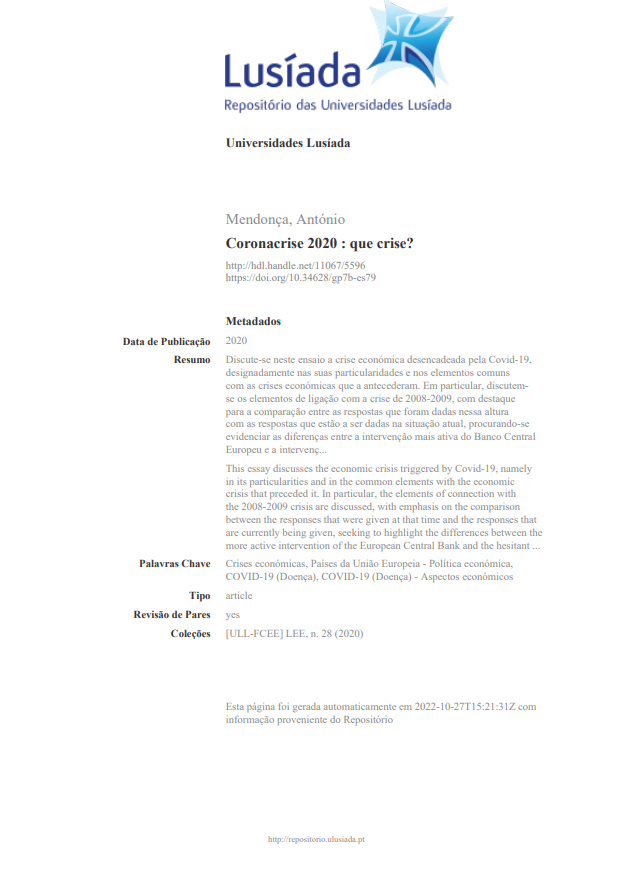
Coronacrise 2020: que crise?
Abstract:
The forecasts already published by national and international institutions on the impact of Covid-19 on economies confirm what had already been anticipated: deep falls in product and employment, fuelled by the joint reduction in consumption, investment and international trade, with consequent effects on deficits and public debt. Coronacrise 2020: que crise? discusses the economic crisis triggered by Covid-19, namely in its particularities and in the common elements with the economic crisis that preceded it. In particular, the elements of connection with the 2008-2009 crisis are discussed, with emphasis on the comparison between the responses that were given at that time and the responses that are currently being given, seeking to highlight the differences between the more active intervention of the European Central Bank and the hesitant and contradictory intervention of national and European institutions with responsibility for fiscal policy. We highlight the need for an economic recovery plan, with a European dimension and integrating national specificities, as well as the need for a change in attitude regarding the role of economic policy, that should favor a long-term expansionist perspective instead of the contractionary perspective which has conditioned European macroeconomic management in recent years.
Quotation:
Mendonça, A. (2020). “Coronacrise 2020: que crise?”. Lusíada. Economia & Empresa, nº 28 (2020), pp. 11-41. https://doi.org/10.34628/gp7b-es79
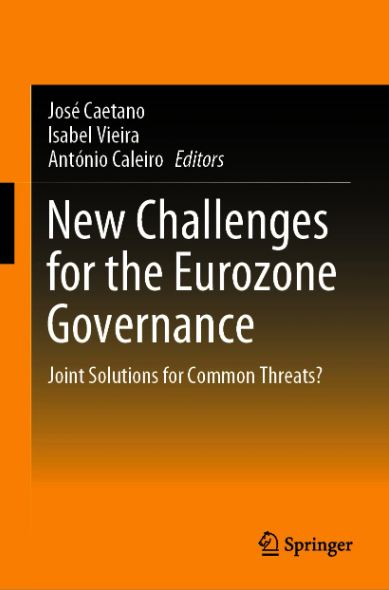
Europe at the crossroads of the COVID-19 crisis: integrated macroeconomic policy solutions for an asymmetric area
Abstract:
The economic crisis triggered by the COVID–19 pandemic once again raises doubts about the eurozone’s ability to deal with joint economic problems given its dissimilar dynamics and asymmetries. Europe at the crossroads of the COVID-19 crisis: integrated macroeconomic policy solutions for an asymmetric area contributes to a paradigm shift in the governance of the euro area towards a more comprehensive and integrated approach. Two dimensions of this paradigm are considered. First, the need for a change in the economic policy concerning the recovery, from a supply-push to a demand-pull orientation, supported on a fiscal and monetary policy mix, integrated within a comprehensive macroeconomic approach. Second, we examine the need for a shift in external relations towards a more global integration-oriented policy, with the euro area positioning itself as an alternative to the current polarization between the United States and China. Our conclusions point to: (i) giving priority to growth and employment; (ii) promoting long-term economic sustainability based on integrated macroeconomic policies, the reduction of income concentration, and the reconstitution of strong middle classes; (iii) reorientating international relations into a perspective of cooperation; (iv) reinforcing regulation and global governance; and (v) eliminating exceptional situations and ways to evade economic controls.
Quotation:
“Mendonça, A. and Vale, S. (forthcoming). “Europe at the crossroads of the COVID-19 crisis: integrated macroeconomic policy solutions for an asymmetric area”, (co-autoria com Vale, S.), in New challenges for Eurozone Governance: Are there joint solutions for common threats? (Edit. José Caetano, Isabel Vieira, and António Caleiro), London: Springer. ISBN-10:3030623718″
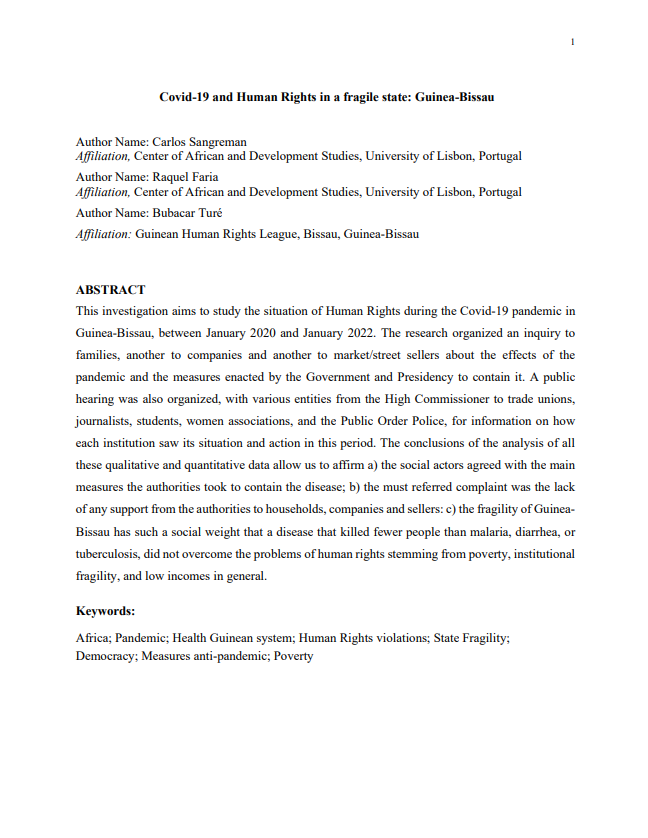
COVID-19 and Human Rights in a Fragile State: Guinea-Bissau
Abstract:
COVID-19 and Human Rights in a Fragile State: Guinea-Bissau aims to study the situation of Human Rights during the Covid-19 pandemic in Guinea-Bissau, between January 2020 and January 2022. The research organized an inquiry to families, another to companies and another to market/street sellers about the effects of the pandemic and the measures enacted by the Government and Presidency to contain it. A public hearing was also organized, with various entities from the High Commissioner to trade unions, journalists, students, women associations, and the Public Order Police, for information on how each institution saw its situation and action in this period. The conclusions of the analysis of all these qualitative and quantitative data allow us to affirm a) the social actors agreed with the main measures the authorities took to contain the disease; b) the must referred complaint was the lack of any support from the authorities to households, companies and sellers: c) the fragility of Guinea-Bissau has such a social weight that a disease that killed fewer people than malaria, diarrhea, or tuberculosis, did not overcome the problems of human rights stemming from poverty, institutional fragility, and low incomes in general.
Quotation:
Sangreman, C., Faria, R. T., & Turé, B. (2022). COVID-19 and Human Rights in a Fragile State: Guinea-Bissau. In P. Andrade, & M. Martins (Ed.), Handbook of Research on Urban Tourism, Viral Society, and the Impact of the COVID-19 Pandemic (pp. 341-360). IGI Global. https://doi.org/10.4018/978-1-6684-3369-0.ch018
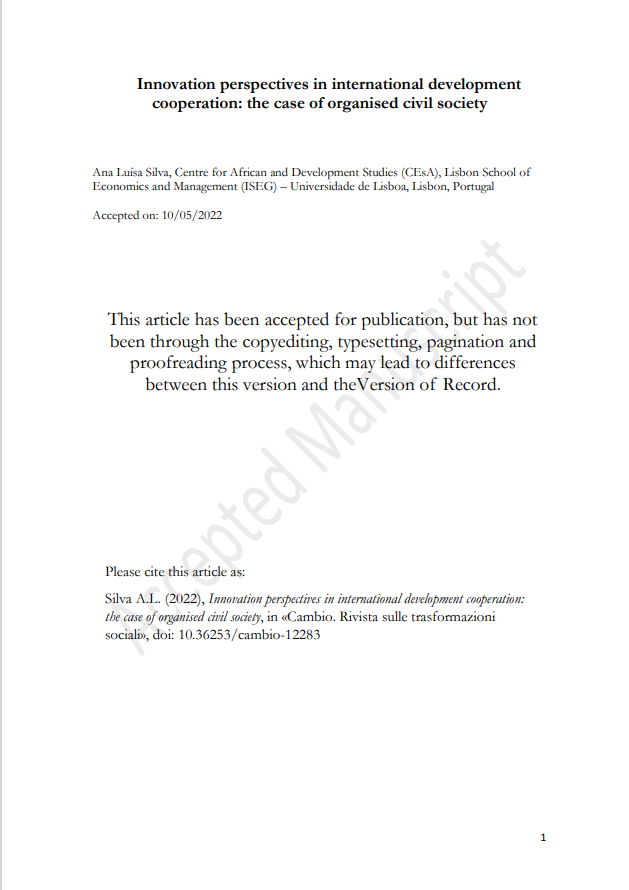
Innovation Perspectives in International Development Cooperation: The case of organised civil society
Abstract:
Non-governmental organisations (NGOs) are still in the side-lines of the emerging literature on innovation in international development cooperation, although the topic has been gaining prominence since the 2000s, accompanying the wider transformation of the development cooperation field. Innovation perspectives in international development cooperation: the case of organised civil society presents the results of a mixed methods research that involved a broad geographic sample of 20 NGO national co-ordinating bodies through an online survey and semi-structured interviews. The goal was to map and analyse innovation perspectives, motivations, and practices in these organisations, understand their relationship with mainstream views of innovation in the field and uncover their potential to promote inclusive innovation. Results suggest that these actors have potential to promote inclusive innovation practices in the field, since they approach innovation with social change as an end goal, as opposed to having an overly solutionist and problem-solving view of social innovation. The paper also highlights the key role of information and communications technologies, as well as digital tools, as both a reason to innovate and enablers of innovation in these organisations. Finally, the conclusion leaves questions open for further research on innovation in development NGOs.
Quotation:
Silva, A. L. (2022). Innovation perspectives in international development cooperation: the case of organised civil society. Cambio. Rivista Sulle Trasformazioni Sociali. https://doi.org/10.36253/cambio-12283
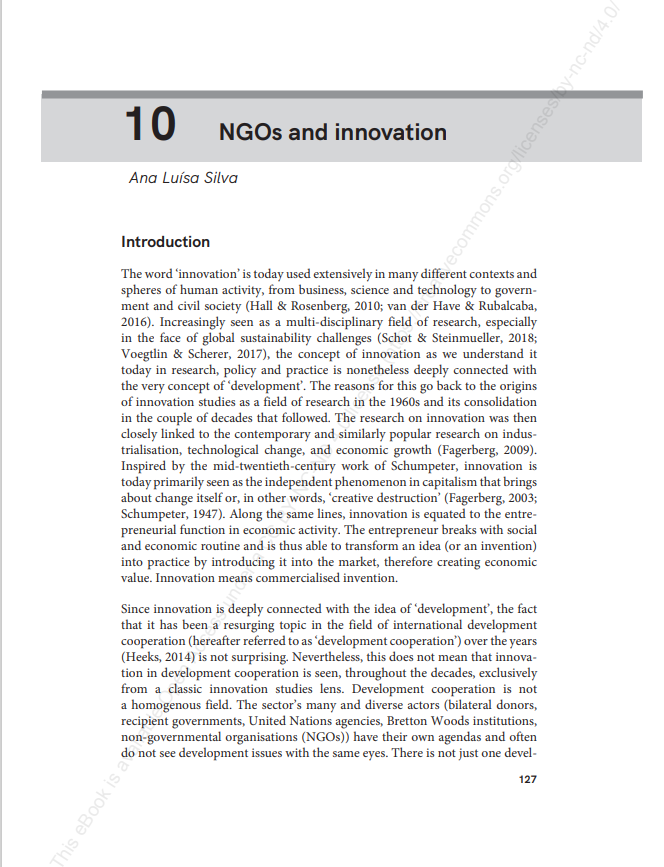
NGOs and Innovation
Abstract:
Over the past twenty years, and against the backdrop of a profound transformation in the international development cooperation sector, innovation has resurged as a ‘hot’ topic in the field. In the same period, development non-governmental organisations (NGOs) face growing challenges of legitimacy, accountability, and dependence on government funding. Their role as precursors of alternative development models, natural social innovators, and catalysts of international solidarity movements is increasingly being questioned. These challenges have been further exacerbated by the Covid-19 pandemic. Existing research on development NGO innovation focuses, like most classic innovation research in other fields, on studying specific, usually successful, innovations; leaving many questions unanswered on topics like innovation failure, processes, culture, funding, motivations, as well as the role of NGOs in innovation for development. This chapter, NGOs and Innovation, by Ana Luísa Silva, gives an overview of the state of the art on development NGOs and innovation, identifying areas that are open for further research. This article is inserted in A Research Agenda for Civil Society, a book by Kees Biekart and Alan Fowler.
Quotation:
Silva, A. L. (2022). NGOs and Innovation. In K. Biekart & A. Fowler (Ed.), A Research Agenda for Civil Society (pp. 127-142). Elgar Research Agendas. Edward Elgar. ISBN: 978 1 80037 814 8

Ana Luisa Silva/CEsA publishes a chapter on NGOs and Innovation in the book “A Research Agenda for Civil Society” (Edward Elgar)
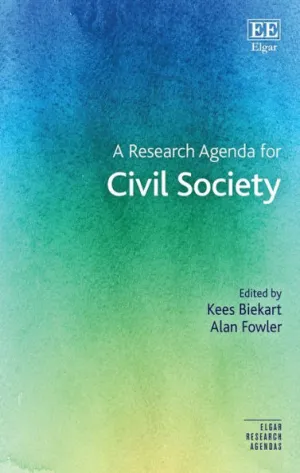
CEsA researcher Ana Luisa Silva has published the article “NGOs and Innovation”, produced within the scope of her PhD thesis for the Program in Development Studies (PDED/ISEG). The article is part of chapter 10 of the book “A Research Agenda for Civil Society” (Edward Elgar). The publication maps a wide range of civil society research perspectives and provides a critical insight into the future of research in this area of knowledge, taking into account the domestic outcomes of major geopolitical changes and the increasing shift towards authoritarian and populist systems of governance.
The book will be presented in an online event on November 8, 2022, at 3pm (Lisbon time) (click here for more information).
Presentation of the book “A Research Agenda for Civil Society” (Edward Elgar)
November 8, 2022
3 pm (Lisbon time)
More information: https://www.istr.org/events/EventDetails.aspx?id=1680647&group=
More about the author:
Ana Luísa Silva is an international development practitioner and researcher. She has a background in Political Science and International Relations and completed an MSc in Development Studies at the London School of Economics and Political Science in 2009. Between 2009 and 2015 she worked as an NGO Project Manager for British NGO Transaid (specialising in transport and development issues) in Nigeria, Madagascar and Mozambique, implementing innovative solutions to improve transport systems for healthcare access in remote areas. Most recently, she engaged with the European startup eco-system organising events to connect investors to innovators working on greener and more sustainable solutions in the energy, water, waste management, agriculture, transport and other key sectors which need transformational change for a sustainable future. Since 2017, she is back to academia, pursuing a PhD in Development Studies at ISEG (Lisbon School of Economics and Management) – Universidade de Lisboa. She is currently conducting research on how the development cooperation sector is supporting innovation for sustainable development and how this innovation-push is impacting development practice, with a focus on development Non-Governmental Organisations (NGOs).
Author: CEsA Communication Team (comunicacao@cesa.iseg.ulisboa.pt)
Image: CEsA/Reproduction

Seminar “Global Governance in Hard Times: The case of regional development banks” will take place on November 9th, 2022
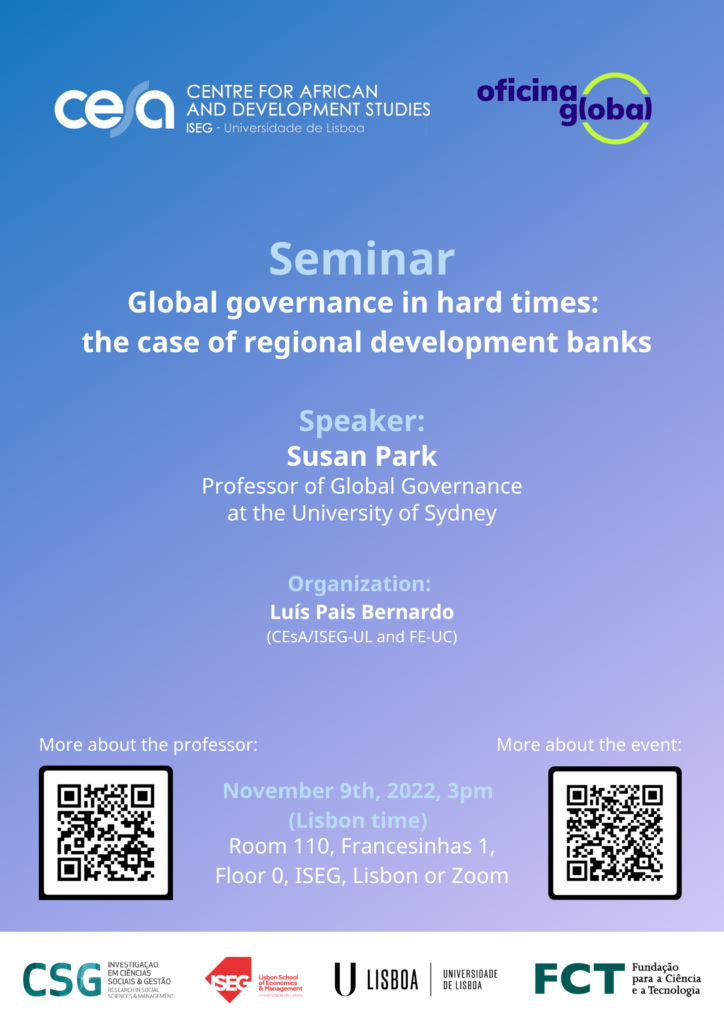
The Centre for African and Development Studies (CEsA/CSG/ISEG/ULisboa) invites all interested parties to attend the seminar “Global Governance in Hard Times: The case of regional development banks” with Susan Park, Professor of Global Governance at the University of Sydney, in November 9th, 2022, at 3pm, in person at Room 110 (Francesinhas 1), ISEG – Lisbon School of Economics and Management or via Zoom, with free entrance.
Susan Park has devoted her research to the articulation of informal norms in international organisations, transnational environmental governance and regional development banks. Her research has focused on Multilateral Development Banks (MDBs), including the World Bank, World Bank Group and African, Asian, Inter-American Development Banks and the European Bank for Reconstruction and Development. Her latest book, “The Good Hegemon: US Power, Accountability as Justice, and the Multilateral Development Banks”, discusses the accountability norm and US influence on multilateral development banks.
To learn more about the author, click here.
The seminar will start from the premise that regional development banks are economic actors often ignored or downplayed in studies on international development governance. With the challenges created by pandemic and war, it becomes urgent to revisit these organisations.
The event is organised by Luís Pais Bernardo, researcher at CEsA/CSG/ISEG/ULisboa and visiting assistant professor at FE-UC.
Zoom access: click here.
Author: CEsA Communication Team (comunicacao@cesa.iseg.ulisboa.pt)
Image: CEsA/Reproduction
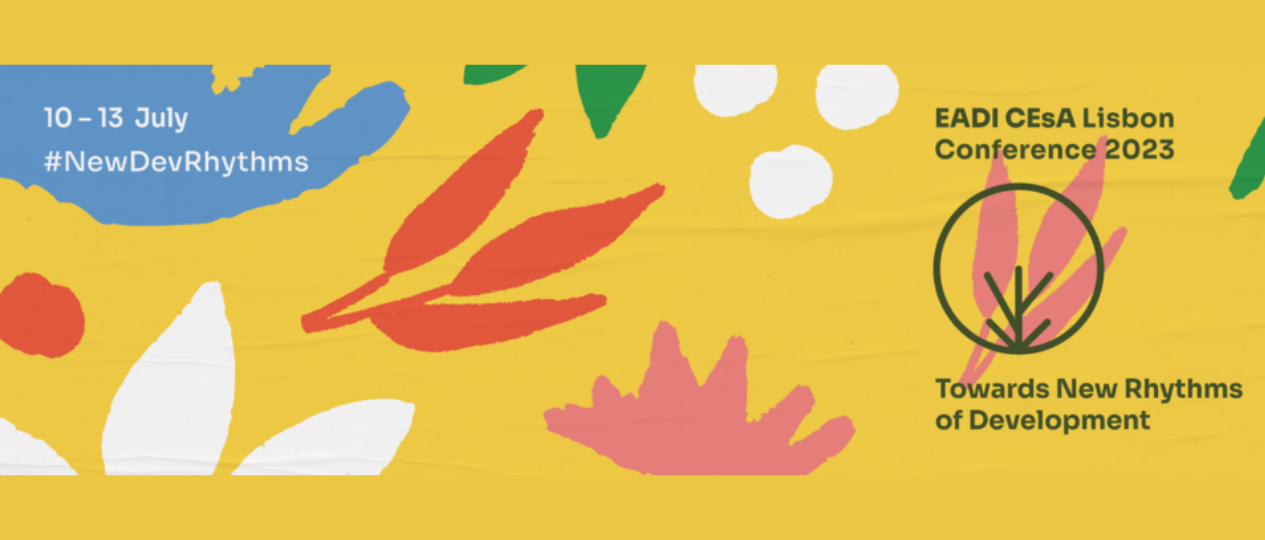
EADI CEsA Lisbon Conference 2023 aims to map new rhythms of development in a global scenario of increasingly profound crises and challenges

CEsA is pleased to announce the “EADI CEsA Lisbon Conference 2023: Towards New Rhythms of Development”, which will take place from 10th to 13th of July, 2023 at the Lisbon School of Economics and Management (ISEG), University of Lisbon ( ULisboa), in Lisbon, Portugal.
The Conference aims to rethink development in the face of increasingly profound shifts in global relations, inequalities, and forms of exclusion.
Different panel formats
We seek to provide spaces for discussion, engagement, sharing, and co-creation between conveners, collaborators, and participants. For this reason, the conference provides space for a variety of different panels and sessions:
Seed Panels
Included in the open call for abstracts (opens October 2022) are
Provide a platform to present work in progress and/or innovative ideas
Not necessarily the presentation of a full paper
Constructive feedback to applicants is expected after submission of papers as well as during the session
Harvest Panels
Are included in the open call for abstracts (opens October 2022)
Provide a space to present completed research and research findings
Conveners may choose to make submission of full papers mandatory, but should be prepared to provide adequate commentary on submitted papers
Conveners are asked to explore the possibilities of publishing contributions
Workshop Sessions
Limited number of participants, with prior registration
Not included in the call for abstracts
Sessions may have
An academic focus
A research practice focus
A skills focus
A creative focus
Roundtable Sessions
Roundtable sessions are not included in the call for abstracts
The organisers are responsible for inviting panel members and securing funding for their participation
Roundtable sessions may have an academic, practical, or programmatic focus
Important Information
Seed Panels, Harvest Panels and Roundtable Sessions can be organised in hybrid form, with either face-to-face or online participation. However, please note that Workshops can only be organised face-to-face and not in hybrid format.
Any natural person (convener or co-convener) may participate in the organisation of a maximum of two panels.
For each panel, at least one (co-)convener must be physically present at the conference in Lisbon, i.e. it is not possible to organise a panel only remotely convened.
Please note that panels/sessions are limited to a maximum of two schedules (subject to approval based on logistical constraints).
We encourage conveners to aim for diverse and gender-balanced panel sessions, with adequate representation of young scholars and academics from the Global South.
Funding
For this conference, we apply a “collective funding” approach. All working groups and institutions presenting on a panel and participating in the Conference are expected to be self-funded. This refers to paying registration fees, organising travel with speakers from the Global South and possibly cost-sharing for the panel organisers for the provision of special technical equipment. EADI will provide an online panel and paper management system to all panel and working group organisers in order to create an online conference programme with all papers and presentations available for download.
Submission of proposals and contact
Proposals can be submitted until 4 September 2022.
To submit a proposal, please complete the Microsoft form (ACCESS HERE)
Important: please be as thorough as possible in the details you provide about the session.
For any questions, you can contact the conference team at: conference2023@eadi.org





